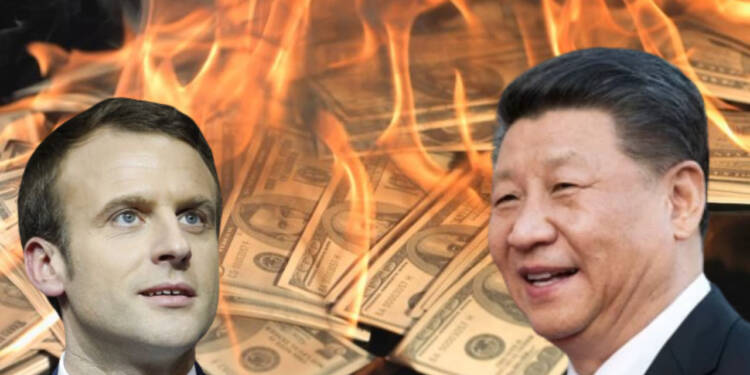In recent years, there has been a significant global shift away from the dominance of the US dollar in international trade and finance. This trend, known as de-dollarization, refers to decreasing reliance on the US dollar as a medium of exchange, store of value, and unit of account.
Unpacking the dollar has gained momentum as countries seek to diversify their currency holdings, reduce vulnerability to economic sanctions and strengthen their financial independence. This article explores the causes and consequences of the upward trend in dollarization while shedding light on the opposition to the French dollar in the 1960s.
Resistance to the French Dollar in the 1960s
The roots of the dismantling of the dollar go back to the 1960s, when France, under the leadership of President Charles de Gaulle, expressed opposition to the hegemony of the American dollar in international finance. At the time, the US dollar was the anchor of the Bretton Woods system, where significant currencies were tied to the dollar, which in turn was convertible to gold at a fixed rate.
However, as the United States ran a persistent trade deficit and increased spending on the Vietnam War, converting the dollar into gold became increasingly unsustainable.

France, worried about the United States’ ability to maintain the dollar’s value, sought to diversify its reserves and reduce its dependence on the American currency. In 1965, the French government announced its decision to exchange $150 million of its dollar reserves for gold, raising concerns about the dollar’s credibility.
This move, along with President de Gaulle’s demand for an international monetary system based on a basket of currencies, reflected France’s dissatisfaction with the dominance of the dollar and a desire for a fairer global financial system.
Reasons for Pain in the Modern Context
However, the time has changed and modern-day factors are stronger than ever.
1. Geopolitical changes and economic sanctions.
The geopolitical landscape has undergone significant changes as emerging economies have emerged and challenged the traditional dominance of the United States and the West. When countries like Russia, China, and Iran faced economic sanctions imposed by the US, they tried to reduce their vulnerability by reducing their dependence on the US dollar.
These countries have actively sought alternatives to the dollar in trade settlements, including using their national currency or entering into bilateral exchange agreements.
2. Diversification of reserves
Many countries have diversified their holdings because they know the risks associated with an excessive concentration of reserves in one currency. This is due to the need to mitigate the impact of currency fluctuations, economic shocks, and geopolitical uncertainty. Central banks increased their purchases of other currencies, such as the euro, yen, yuan, and gold, to reduce their exposure to the US dollar.
3. Strengthening of Regional Integration
Regional initiatives and organizations played a vital role in eliminating the dollar. For example, the creation of the Eurasian Economic Union (EAEU), which consists of countries such as Russia, Belarus, Kazakhstan, Armenia, and Kyrgyzstan, encouraged the use of national currencies in trade agreements between member states.
Also, the creation of the new BRICS Development Bank and Contingent Reserve encouraged members (Brazil, Russia, India, China, and South Africa) to look for alternatives to the dollar in financial transactions.
Consequences of Pain
Economic effects: The dollar’s collapse creates challenges and opportunities for economies. On the one hand, reducing dependence on the dollar can increase monetary sovereignty and reduce vulnerability to external shocks.
However, it also includes risks such as possible currency fluctuations and transaction costs of using alternative currencies. In addition, the result could be a significant reduction in demand for the US dollar Currency weakening and the negative impact on the US economy.
Changes in global power dynamics: The dollar’s collapse changes the balance of power in global finance. As the influence of the US dollar weakens, other currencies and regional blocs emerge. This trend could strengthen the position of countries like China, which is trying to raise the renminbi’s international role (yuan).
Calls for a more versatile, multipolar system with a basket of reserve currencies have gained momentum. Some suggest creating a supranational currency or expanding the role of the Special Drawing Rights (SDR) of the International Monetary Fund to reduce dependence on a common currency. Such reforms would require international cooperation and coordination among major economies.
Read More: Egypt has joined BRICS’ de-dollarisation campaign
The increasing dollarization trend reflects the changing global landscape and the aspirations of countries for greater economic and financial independence worldwide. The resistance to the French dollar in the 1960s serves as a historical precedent for the current move away from the American currency.
Although the reasons and consequences of losing the dollar vary, it is clear that reducing dependence on the US dollar has become a priority for many countries. As this trend continues, significant changes will occur in the global economy, affecting international finance and the geopolitical dynamics of power and influence.
Watch More:








